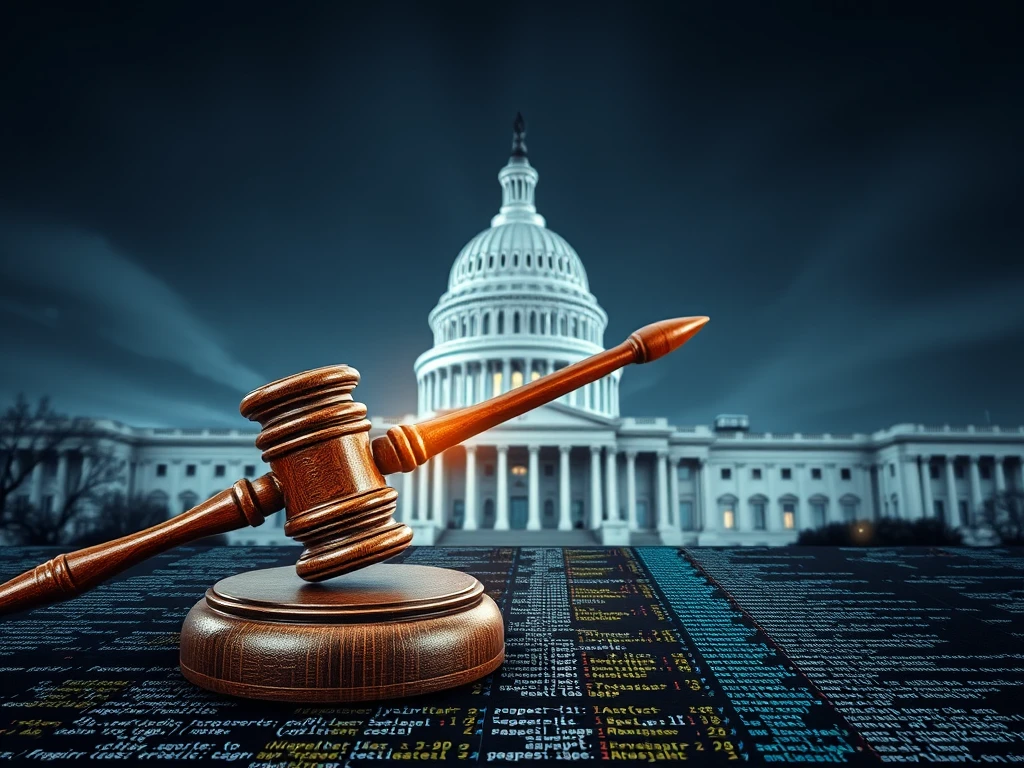Urgent Crypto Plea: Congress Must Overhaul DOJ Rule Against Tornado Cash Devs

Is the Department of Justice (DOJ) stifling crypto innovation with outdated rules? A powerful coalition of crypto companies is sounding the alarm, urging Congress to step in and revise a DOJ interpretation of money transmitting laws they say is being unfairly used against developers, particularly those behind Tornado Cash. This move could have chilling consequences for the entire crypto industry and software development within the United States. Let’s dive into why crypto firms are in a frenzy and what this could mean for the future of digital assets.
Why Crypto Firms Are Demanding a Change to the DOJ Rule
A significant group of 34 crypto firms and advocacy groups, including industry giants like Kraken and Coinbase, have penned a compelling letter to Congress. Their core argument? The DOJ’s current interpretation of money transmitting laws is “unprecedented and overly expansive,” creating dangerous ambiguity for anyone involved in crypto software development. They believe this broad interpretation, highlighted in the indictments of Tornado Cash developers, could inadvertently criminalize essentially every blockchain developer.
This isn’t just about Tornado Cash anymore. The crypto industry perceives this as a systemic issue that threatens the very foundation of innovation in the digital asset space within the US. The letter, spearheaded by the DeFi Education Fund, points out the DOJ’s stance, which seemingly disregards previous FinCEN guidance, creates a situation where:
- Innovation is Stifled: Developers fear creating new technologies due to potential legal repercussions.
- Confusion Reigns: Two government agencies (DOJ and FinCEN) appear to have conflicting interpretations of ‘money transmission.’
- US Competitiveness Suffers: The US risks losing its edge in the rapidly evolving digital asset landscape.
The Core of the Dispute: Interpreting Money Transmitting Laws
The heart of the matter lies in how the DOJ is interpreting existing money transmitting laws. The crypto firms argue that the DOJ is sidestepping established definitions and guidance, specifically from FinCEN. Let’s break down the key legal points:
| Legal Section | Description | Crypto Firms’ Argument | DOJ’s Alleged Stance |
|---|---|---|---|
| Title 31 section 5330 | Defines who needs to be licensed as a money transmitter. | Should be relevant in determining who is operating an unlicensed money transmitting business. | Allegedly considers this section irrelevant when determining unlicensed money transmission under Section 1960. |
| Title 18 section 1960 | Criminalizes operating an unlicensed money transmitting business. | Should be interpreted in conjunction with Section 5330 and FinCEN guidance. | Allegedly interpreting this section broadly, independent of Section 5330 and FinCEN’s guidelines. |
| FinCEN 2019 Guidance | Clarifies money transmitting activities, stating software developers without control over customer funds are not money transmitters. | DOJ should adhere to this guidance. | Allegedly ignoring this guidance in prosecutions like Tornado Cash developers. |
The crypto firms emphasize that FinCEN’s 2019 guidance clearly states that if a software developer never takes possession or control of user funds, they are not operating a ‘money transmitting business.’ They believe the DOJ’s actions against Tornado Cash developers and Samourai Wallet co-founders contradict this established understanding, creating a dangerous precedent.
Tornado Cash and the DOJ Rule: A Case Study in Controversy
The prosecution of Tornado Cash developers Roman Storm and Roman Semenov is cited as a prime example of the DOJ’s controversial application of the DOJ rule. Charged with money laundering and operating an unlicensed money transmitting business, the developers, according to the crypto coalition, are being unfairly targeted for simply creating software.
This case has sent shockwaves through the crypto developer community. Is writing code now a criminal act? The industry fears that if the DOJ’s interpretation stands, developers of privacy-enhancing technologies, decentralized exchanges, and various other crypto tools could face similar legal battles. The implications are far-reaching and could stifle innovation in critical areas of the crypto space.
Congress, the Last Hope for Crypto?
The crypto industry is now turning to Congress for intervention. Their letter urges lawmakers to pressure the DOJ to reconsider its stance and amend its interpretation of money transmitting laws. They are asking for clarity and a regulatory framework that fosters innovation rather than criminalizing it.
Michael Lewellen of Coin Center has even taken legal action, suing Attorney General Merrick Garland to preemptively protect non-custodial software releases. This proactive lawsuit underscores the deep concern within the crypto community and their determination to challenge what they see as an overreach by the DOJ.
What’s at Stake? The Future of Crypto Innovation in the US
The outcome of this battle over the DOJ rule will significantly shape the future of crypto innovation in the United States. If the DOJ’s interpretation prevails, the consequences could be dire:
- Exodus of Developers: Fear of prosecution could drive talented developers to relocate to more crypto-friendly jurisdictions.
- Innovation Vacuum: The US could fall behind in the global race for crypto innovation.
- Chilled Investment: Uncertainty and legal risks could deter investment in US-based crypto projects.
Conversely, if Congress compels the DOJ to revise its DOJ rule and adopt a more nuanced and innovation-friendly approach, it could unlock a new wave of growth and development in the crypto sector within the US. The coming months will be critical in determining whether the US remains a hub for crypto innovation or risks becoming a hostile environment for this transformative technology.
The crypto industry’s plea to Congress is a powerful call for reason and regulatory clarity. The future of crypto innovation in the US hangs in the balance, dependent on whether lawmakers can effectively address this urgent issue and ensure a fair and innovation-friendly regulatory landscape.








